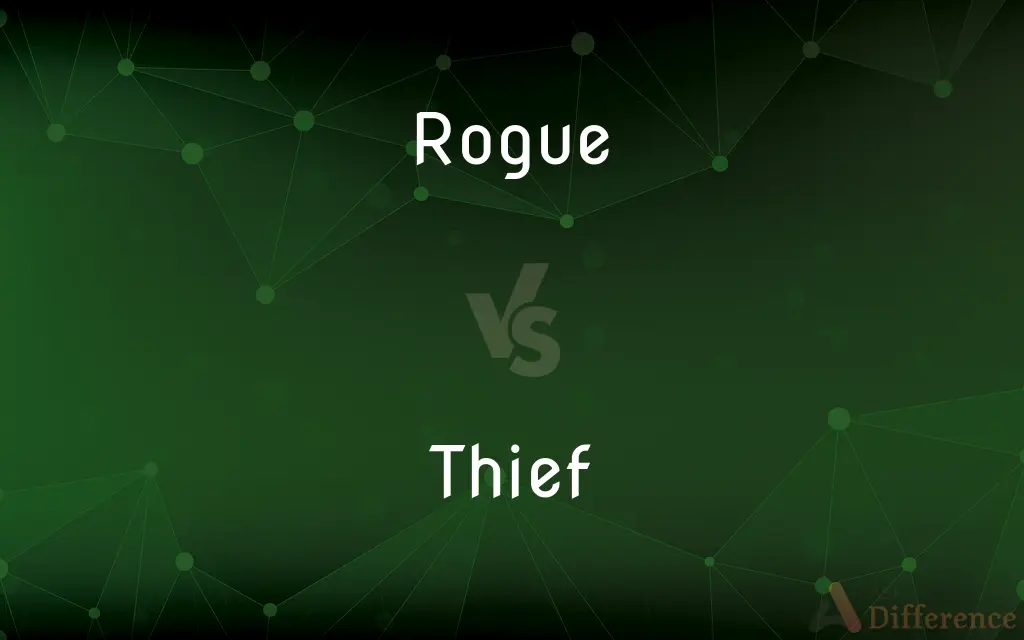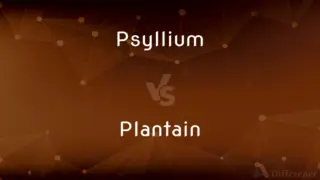Rogue vs. Thief — What's the Difference?
Edited by Tayyaba Rehman — By Fiza Rafique — Updated on March 29, 2024
A rogue is a deceitful or unprincipled person, often charming, who operates outside the norms, while a thief specifically refers to someone who steals property.

Difference Between Rogue and Thief
Table of Contents
ADVERTISEMENT
Key Differences
Rogues embody a broad spectrum of characteristics, including deceit, cunning, and often a certain charm that allows them to navigate social situations to their advantage. Their activities aren't limited to theft; they may involve various forms of trickery or rule-breaking. Thieves, in contrast, are defined by their action of stealing — taking something that belongs to another without permission and with the intent to permanently deprive the owner of it.
Rogues are often romanticized in literature and media, portrayed as clever tricksters or lovable scoundrels who defy conventions or authority with a mix of intelligence, charisma, and strategic deceit. Thieves, while they can also be portrayed with a degree of romanticism, are more specifically focused on the act of theft, and their portrayals often lack the broader, sometimes positive, connotations associated with rogues.
The concept of a rogue encompasses a wide array of behaviors that go beyond illegal activities and can include anyone acting outside societal norms or engaging in unconventional behavior without malicious intent. Thieves, however, are primarily motivated by the gain from their illicit activities, focusing on the tangible benefits of their actions.
In fantasy literature and role-playing games, the rogue character class often includes thieves but is not limited to them, encompassing spies, scouts, and other characters skilled in stealth, lockpicking, and sometimes magic, such as illusions. This contrasts with the thief's more narrow focus on stealth and stealing, though both share skills related to stealth and evasion.
The term "rogue" can also be used more playfully or affectionately to describe someone who bends rules without serious harm, while "thief" carries a predominantly negative connotation, focusing on the unethical or illegal act of theft. This distinction highlights the broader societal implications of being labeled as either, where rogues can sometimes be seen in a positive light, whereas thieves are generally viewed with disapproval.
ADVERTISEMENT
Comparison Chart
Definition
A person known for deceit and operating outside norms.
A person who steals property from others.
Connotations
Often charming, cunning; not always negative.
Predominantly negative.
Activities
Deceit, trickery, unconventional behavior.
Specifically focused on stealing.
Portrayal in Media
Romanticized as clever, charismatic.
More narrowly depicted; often lacks charm.
Motivations
Varied, not exclusively for personal gain.
Primarily for personal gain through theft.
In Fantasy/Role-Playing
Broad class including spies, scouts; skilled in stealth.
Focus on stealth and stealing.
Compare with Definitions
Rogue
A rogue can charm their way out of trouble.
The rogue winked and talked his way past the guards.
Thief
Thieves operate by stealth and take possessions secretly.
The thief slipped into the house without a sound.
Rogue
They often flout rules for personal gain or amusement.
She played the rogue in business, always bending the rules.
Thief
Their primary aim is the acquisition of wealth.
Thieves targeted the jewelry store for its valuable contents.
Rogue
Not all rogues are criminals; some are just unconventional.
He was known as a rogue scientist for his unorthodox methods.
Thief
Security measures are designed to thwart thieves.
The museum installed advanced security to deter thieves.
Rogue
Rogues might use deceit in politics or love.
The political rogue manipulated public opinion with charm.
Thief
In literature, thieves might belong to guilds or operate solo.
The thief was a member of the city's infamous guild.
Rogue
In games, rogues possess diverse skills beyond thievery.
The game's rogue character could unlock doors silently and cast illusion spells.
Thief
Some thieves specialize in certain types of theft.
The art thief had a keen eye for priceless paintings.
Rogue
A dishonest or unprincipled man
You are a rogue and an embezzler
Thief
One who commits the act or crime of theft.
Rogue
An elephant or other large wild animal living apart from the herd and having savage or destructive tendencies
A rogue elephant
Thief
One who carries out a theft.
Rogue
Remove inferior or defective plants or seedlings from (a crop)
The sowing has to be rogued to remove aberrant seedlings
Thief
One who steals another person's property, especially by stealth and without using force or violence.
Rogue
An unprincipled, deceitful, and unreliable person; a scoundrel or rascal.
Thief
(obsolete) A waster in the snuff of a candle.
Rogue
One who is playfully mischievous; a scamp.
Thief
One who steals; one who commits theft or larceny. See Theft.
There came a privy thief, men clepeth death.
Where thieves break through and steal.
Rogue
A wandering beggar; a vagrant.
Thief
A waster in the snuff of a candle.
Take heed, have open eye, for thieves do foot by night.
Some roving robber calling to his fellows.
Rogue
A vicious and solitary animal, especially an elephant that has separated itself from its herd.
Thief
A criminal who takes property belonging to someone else with the intention of keeping it or selling it
Rogue
An organism, especially a plant, that shows an undesirable variation from a standard.
Rogue
Vicious and solitary. Used of an animal, especially an elephant.
Rogue
Large, destructive, and anomalous or unpredictable
Rogue tornado.
Rogue
Operating outside normal or desirable controls
"How could a single rogue trader bring down an otherwise profitable and well-regarded institution?" (Saul Hansell).
Rogue
To remove (diseased or abnormal specimens) from a group of plants of the same variety.
Rogue
To remove diseased or abnormal plants.
Rogue
A scoundrel, rascal or unprincipled, deceitful, and unreliable person.
Rogue
A mischievous scamp.
Rogue
A vagrant.
Rogue
(computing) Deceitful software pretending to be anti-spyware, but in fact being malicious software itself.
Rogue
An aggressive animal separate from the herd, especially an elephant.
Rogue
A plant that shows some undesirable variation.
Rogue
(role-playing games) A character class focusing on stealthy conduct.
Rogue
(of an animal, especially an elephant) Vicious and solitary.
Rogue
(by extension) Large, destructive and unpredictable.
Rogue
(by extension) Deceitful, unprincipled.
Rogue
Mischievous, unpredictable.
Rogue
(horticulture) To cull; to destroy plants not meeting a required standard, especially when saving seed, rogue or unwanted plants are removed before pollination.
Rogue
To cheat.
Rogue
(obsolete) To give the name or designation of rogue to; to decry.
Rogue
To wander; to play the vagabond; to play knavish tricks.
Rogue
A vagrant; an idle, sturdy beggar; a vagabond; a tramp.
Rogue
A deliberately dishonest person; a knave; a cheat.
The rogue and fool by fits is fair and wise.
Rogue
One who is pleasantly mischievous or frolicsome; hence, often used as a term of endearment.
Ah, you sweet little rogue, you!
Rogue
An elephant that has separated from a herd and roams about alone, in which state it is very savage.
Rogue
A worthless plant occuring among seedlings of some choice variety.
Rogue
To wander; to play the vagabond; to play knavish tricks.
Rogue
To give the name or designation of rogue to; to decry.
Rogue
To destroy (plants that do not come up to a required standard).
Rogue
A deceitful and unreliable scoundrel
Common Curiosities
What motivates thieves?
Thieves are primarily motivated by personal gain, specifically through the act of stealing.
How are rogues and thieves portrayed differently in media?
Rogues are often portrayed as charming and clever, operating with a mix of deceit and cunning, while thieves are focused on the act of theft, with portrayals that emphasize their criminality.
What is the primary activity of a thief?
The primary activity of a thief is stealing — taking someone else's property without permission with the intent to keep it.
Can a rogue be seen in a positive light?
Yes, rogues can sometimes be seen positively, especially if their rule-breaking is portrayed as harmless, clever, or for a greater good.
What defines a rogue in society?
A rogue is characterized by deceitful, unprincipled behavior, often with a charm that allows them to operate outside societal norms, sometimes without malicious intent.
Is thievery always a part of being a rogue?
While thievery can be part of a rogue's activities, it is not a defining characteristic; rogues engage in a broader range of deceitful or unconventional behaviors.
Can a thief be considered a rogue?
A thief can be considered a rogue if they exhibit the broader characteristics associated with rogues, such as cunning and charm, but not all thieves fit the wider definition of a rogue.
How do role-playing games differentiate between rogues and thieves?
Role-playing games often present rogues as a broad character class with skills in stealth, lockpicking, and sometimes magic, while thieves are depicted with a narrower focus on stealing and stealth.
Why do societies view thieves negatively?
Societies view thieves negatively because theft is a direct violation of personal and property rights, causing harm to individuals and communities.
What role do rogues play in fantasy settings?
In fantasy settings, rogues often play the role of adventurers or anti-heroes, using their skills for espionage, combat, and problem-solving, sometimes with moral ambiguity.
Share Your Discovery

Previous Comparison
Psyllium vs. Plantain
Next Comparison
Lat vs. LongAuthor Spotlight
Written by
Fiza RafiqueFiza Rafique is a skilled content writer at AskDifference.com, where she meticulously refines and enhances written pieces. Drawing from her vast editorial expertise, Fiza ensures clarity, accuracy, and precision in every article. Passionate about language, she continually seeks to elevate the quality of content for readers worldwide.
Edited by
Tayyaba RehmanTayyaba Rehman is a distinguished writer, currently serving as a primary contributor to askdifference.com. As a researcher in semantics and etymology, Tayyaba's passion for the complexity of languages and their distinctions has found a perfect home on the platform. Tayyaba delves into the intricacies of language, distinguishing between commonly confused words and phrases, thereby providing clarity for readers worldwide.













































